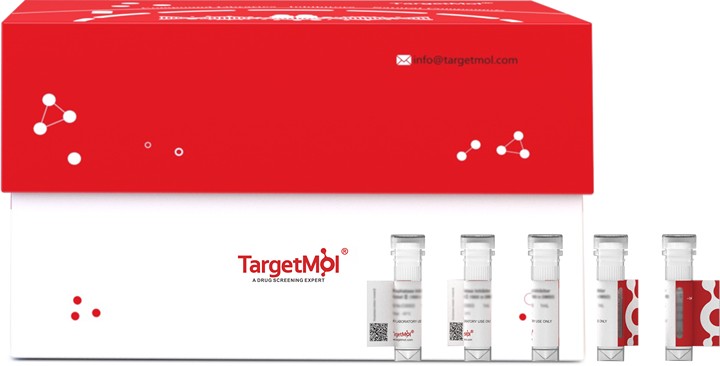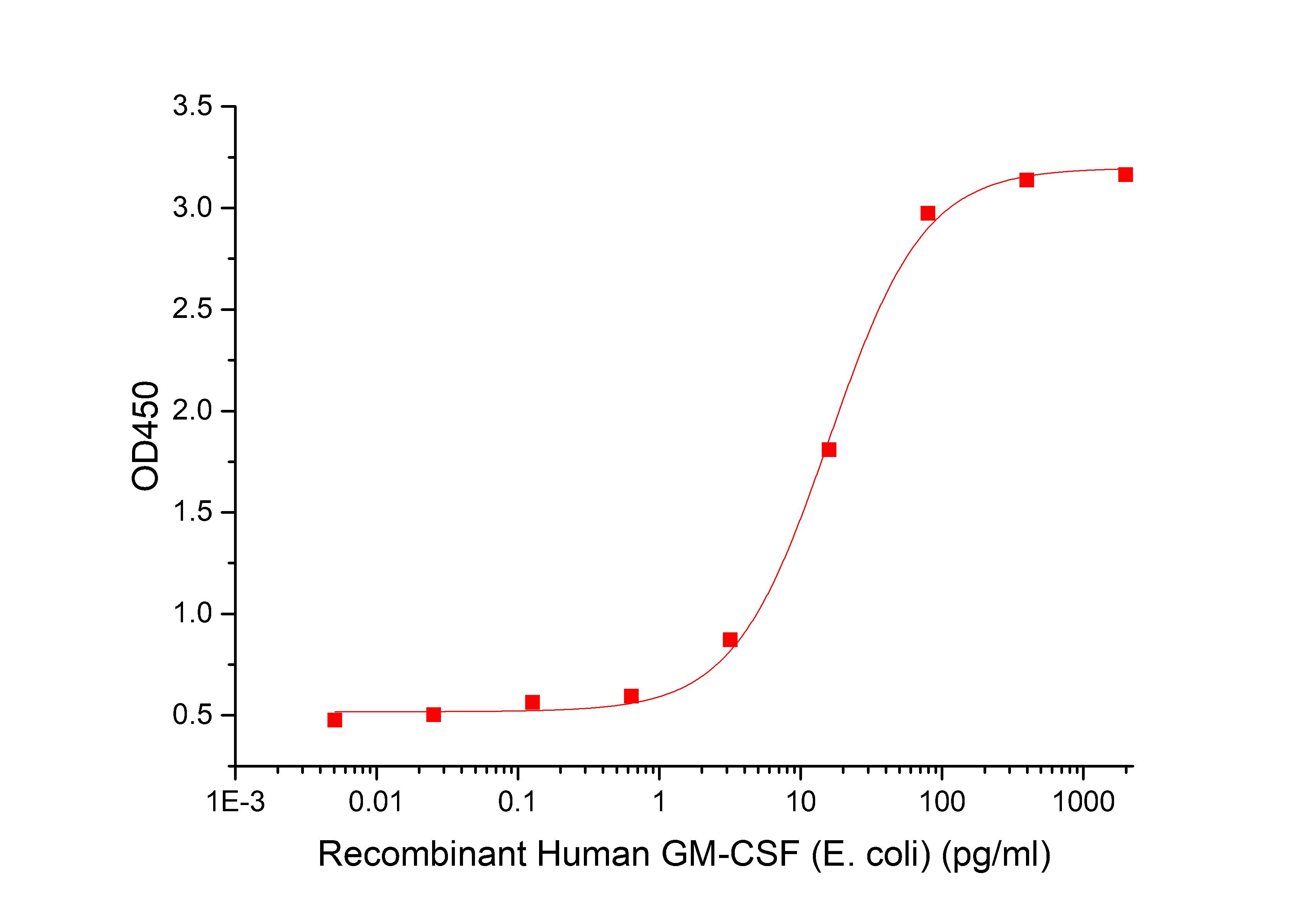 您的购物车当前为空
您的购物车当前为空
GM-CSF/CSF2 Protein, Human, Recombinant (E. coli)
一键复制产品信息别名 集落刺激因子, Sargramostim, Molgramostin, Granulocyte-Macrophage Colony-Stimulating Factor, GM-CSF, GMCSF, CSF2, CSF, Colony-Stimulating Factor
Granulocyte-Macrophage Colony Stimulating Factor (GM-CSF) was initially characterized as a growth factor that can support the in vitro colony formation of granulocyte-macrophage progenitors. It is produced by a number of different cell types (including activated T cells, B cells, macrophages, mast cells, endothelial cells and fibroblasts) in response to cytokine of immune and inflammatory stimuli. Besides granulocyte-macrophage progenitors, GM-CSF is also a growth factor for erythroid, megakaryocyte and eosinophil progenitors. On mature hematopoietic, monocytes/ macrophages and eosinophils. GM-CSF has a functional role on non-hematopoitic cells. It can induce human endothelial cells to migrate and proliferate. Additionally, GM-CSF can also stimulate the proliferation of a number of tumor cell lines, including osteogenic sarcoma, carcinoma and adenocarcinoma cell lines.

GM-CSF/CSF2 Protein, Human, Recombinant (E. coli)
一键复制产品信息Granulocyte-Macrophage Colony Stimulating Factor (GM-CSF) was initially characterized as a growth factor that can support the in vitro colony formation of granulocyte-macrophage progenitors. It is produced by a number of different cell types (including activated T cells, B cells, macrophages, mast cells, endothelial cells and fibroblasts) in response to cytokine of immune and inflammatory stimuli. Besides granulocyte-macrophage progenitors, GM-CSF is also a growth factor for erythroid, megakaryocyte and eosinophil progenitors. On mature hematopoietic, monocytes/ macrophages and eosinophils. GM-CSF has a functional role on non-hematopoitic cells. It can induce human endothelial cells to migrate and proliferate. Additionally, GM-CSF can also stimulate the proliferation of a number of tumor cell lines, including osteogenic sarcoma, carcinoma and adenocarcinoma cell lines.
| 规格 | 价格 | 库存 | 数量 |
|---|---|---|---|
| 5 μg | ¥ 556 | 3日内发货 | |
| 10 μg | ¥ 910 | 现货 | |
| 20 μg | ¥ 1,470 | 5日内发货 | |
| 50 μg | ¥ 2,750 | 5日内发货 | |
| 100 μg | ¥ 4,030 | 5日内发货 |
产品介绍
| 产品描述 | Granulocyte-Macrophage Colony Stimulating Factor (GM-CSF) was initially characterized as a growth factor that can support the in vitro colony formation of granulocyte-macrophage progenitors. It is produced by a number of different cell types (including activated T cells, B cells, macrophages, mast cells, endothelial cells and fibroblasts) in response to cytokine of immune and inflammatory stimuli. Besides granulocyte-macrophage progenitors, GM-CSF is also a growth factor for erythroid, megakaryocyte and eosinophil progenitors. On mature hematopoietic, monocytes/ macrophages and eosinophils. GM-CSF has a functional role on non-hematopoitic cells. It can induce human endothelial cells to migrate and proliferate. Additionally, GM-CSF can also stimulate the proliferation of a number of tumor cell lines, including osteogenic sarcoma, carcinoma and adenocarcinoma cell lines. |
| 生物活性 | Measured in a cell proliferation assay using TF‑1 human erythroleukemic cells.The ED50 for this effect is 4-20 pg/ml. (QC verified)  |
| 研究背景 | Granulocyte-Macrophage Colony Stimulating Factor (GM-CSF) was initially characterized as a growth factor that can support the in vitro colony formation of granulocyte-macrophage progenitors. It is produced by a number of different cell types (including activated T cells, B cells, macrophages, mast cells, endothelial cells and fibroblasts) in response to cytokine of immune and inflammatory stimuli. Besides granulocyte-macrophage progenitors, GM-CSF is also a growth factor for erythroid, megakaryocyte and eosinophil progenitors. On mature hematopoietic, monocytes/ macrophages and eosinophils. GM-CSF has a functional role on non-hematopoitic cells. It can induce human endothelial cells to migrate and proliferate. Additionally, GM-CSF can also stimulate the proliferation of a number of tumor cell lines, including osteogenic sarcoma, carcinoma and adenocarcinoma cell lines. |
| 种属 | Human |
| 表达系统 | E. coli |
| 标签 | Tag Free |
| 蛋白编号 | P04141 |
| 氨基酸序列 | Ala18-Glu144 |
| 蛋白构建 | Ala18-Glu144 |
| 蛋白纯度 | Greater than 95% as determined by reducing SDS-PAGE. Greater than 95% as determined by SEC-HPLC.   |
| 蛋白性状 | Lyophilized powder |
| 缓冲液 | Lyophilized from a solution filtered through a 0.22 μm filter, containing PBS, pH 7.4. |
| 复溶方法 | Reconstitute the lyophilized protein in distilled water. The product concentration should not be less than 100 μg/ml. Before opening, centrifuge the tube to collect powder at the bottom. After adding the reconstitution buffer, avoid vortexing or pipetting for mixing. |
| 别名 | 集落刺激因子, Sargramostim, Molgramostin, Granulocyte-Macrophage Colony-Stimulating Factor, GM-CSF, GMCSF, CSF2, CSF, Colony-Stimulating Factor |
| 内毒素 | < 0.001 ng/µg (0.01 EU/µg) as determined by LAL test. |
| 运输方式 | In general, Lyophilized powders are shipping with blue ice. |
| 存储 | It is recommended to store recombinant proteins at -20°C to -80°C for future use. Lyophilized powders can be stably stored for over 12 months, while liquid products can be stored for 6-12 months at -80°C. For reconstituted protein solutions, the solution can be stored at -20°C to -80°C for at least 3 months. Please avoid multiple freeze-thaw cycles and store products in aliquots. |
计算器
剂量转换
对于不同动物的给药剂量换算,您也可以参考 更多




 很棒
很棒
 |
|